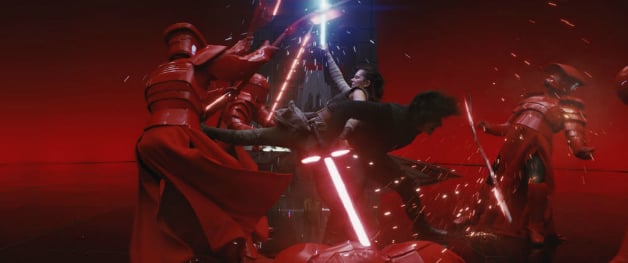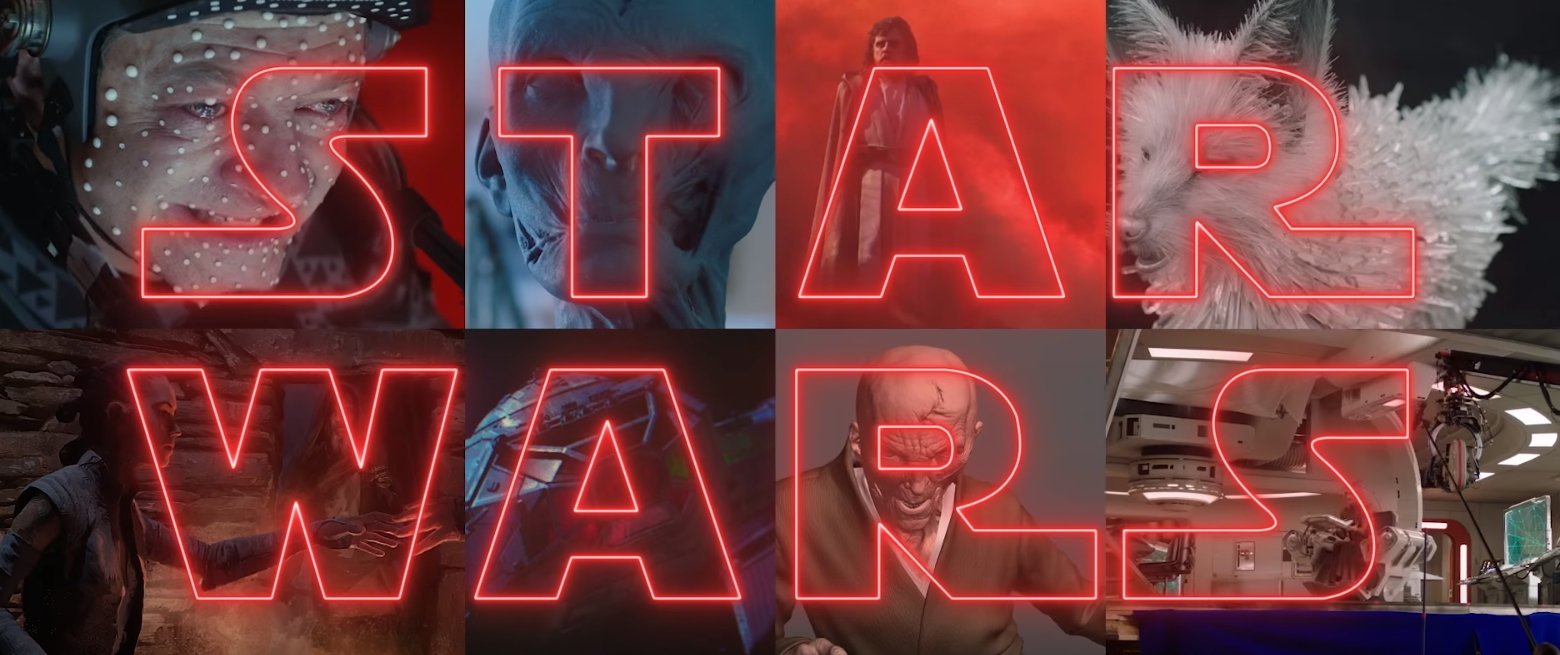Star Wars The Last Jedi: Forbes Weighs in on the Critics vs Fans Debate
There’s a very interesting article in Forbes this week that discusses the divide between critical reception and audience reaction that has been front and center over the past year or so. The article specifically focuses on Star Wars: The Last Jedi, and the divided reactions it has received between critics, general audiences, and die-hard fans.
The basic premise of the article comes from a 2017 study done by psychologist Dr Pascal Wallisch that found that agreement on the quality of a film between audience and critics is no better than agreements between one random viewer to another. Essentially, a random viewer is 26% percent likely to have the same opinion of a film as another random viewer. The number only increases to 27% if the other viewer is a critic. So, to many viewers that may raise questions as to the purpose of the critic.
From Forbes:
Wallisch’s research reflects a broader question in society: who should make decisions: a judge or jury? Critics are effectively judges, perceived as experts with the authority and credibility to assess whether a movie is ‘good’. But the collective opinion of a group instead of a single individual — the wisdom of the crowd — can also produce reliable judgements.
This all makes sense. There will always be some level of divide between a critic and the totality of the audience that hasn’t been trained to, nor has desire to, formally criticize art. But where I disagree with the author of the piece is that this needs to be an either/or situation.
Forbes:
In other words: critics see films as art, while people mainly watch movies for entertainment. Like other kinds of art critic then, film critics might assess a movie as a work of art, so their scores are not a metric for its entertainment value.
This all goes back to the often repeated idea that art challenges the viewer, while entertainment pleases them. Which is a nice way to explain the divide, but far too simplistic in practice. These are extremes, but there are many shades of gray within films and their viewers.
A movie can seek to challenge and to please, just as a viewer can appreciate a film as both art and entertainment simultaneously. To say it needs to be one or the other treats general audiences as too simple minded, and critics as too pretentious.
With the example of The Last Jedi, it doesn’t fit into these neat categories. This is not a case of an experimental art film where only critics enjoy it and regular viewers don’t “get it”. There are millions of people out there who love The Last Jedi that never spent a day in film school, just as there are people out there who don’t like the film for critical reasons.
There is something to this idea, however, that artistic (and not entertainment) decisions are a significant cause of some fan backlash. I just don’t think it is as simple as this being the case of art versus mindless entertainment.
The key here is that metrics like Cinemascore that scientifically measured general audiences and not “fans” were very positive. These are the type of viewers that are most likely to be put off by an art film, but that is not where the divide was found. The divide, at least from anecdotal evidence, seems to lie mostly within fandom. So because of that, it would seem likely that it is not art vs entertainment that has challenged these viewers, but art vs. Star Wars.
Art at its most basic level is about one human being examining the human condition and representing it in some way that causes other humans to think about what it means to be human in different and often challenging and critical ways. What I believe we have in The Last Jedi is something similar, but in the microcosm of Star Wars. Rian Johnson is a Star Wars super fan who turned Star Wars into his art by standing many of its basic concepts and expectations on their end. And by challenging the basic fundamentals of what Star Wars is, it is challenging (and possibly off-putting) to the lifelong Star Wars fan the same way a Jackson Pollock might be to someone looking for a Monet. Both are genius artists, but if you are looking for one, the other won’t cut it.
Meanwhile, in critical circles we have seen the prevalence of geek journalists and movie bloggers rise while mainstream critic positions continue to be more and more populated by people who grew up as Star Wars nerds. Many of these critics got into the business because of Star Wars, using that as their base of knowledge and then applying the education of formal critical analysis on top of that formative experience. And what those people see is art through the lens of the blockbuster.
It’s an exciting prospect for many to see properties like Star Wars deconstructed – to see the expectations of popcorn cinema challenged. In an era where tent-pole franchises are all there is to be found in your local theater, adding that layer is a refreshing change of pace and a fusion of the two worlds these critics have grown out of.
At the same time, it is simultaneously understandable that the fanbase that has been built over decades based on what Star Wars has been, has no interest in seeing that changed or challenged. To some it is heretical to do such a thing. For many of these people, if you buy a ticket to a Star Wars movie you want to see a “Star Wars movie”- not a Jackson Pollock. But it doesn’t mean either side is wrong.
Forbes:
“The public thinks a critic’s job is to see all the movies, and tell them which ones are good,” Wallisch explains. “Critics don’t agree with that, they think their job is to educate the public on what a good movie is — and that’s where the tension comes from: it’s a misunderstanding about the role of the critic.”
The author brings up a great point here. The friction between critic and fan doesn’t come from who is right and who is wrong, it is just a gap in the perceived roles on each side. A critic can’t tell you what movies are good entertainment for you. It’s an impossible task as it’s an entirely subjective decision. Film criticism has developed the way it has for over a hundred years to apply a method to assess a movie and give a subjective assessment of its value through as much of a uniform language for interpreting these things as possible.
So a critic will tell you how they interpret these films and how they stack up within those criteria, but can’t tell you how it will land for you. So film criticism, at that level, is both a recommendation from a subjective opinion, but also an intellectual exercise in how to analyze these sorts of things. If you have no interest in that type of analysis, then you are unlikely to find yourself in agreement with the critical consensus. But in the end there is no objective right or wrong regarding anyone’s opinion.
Forbes:
When two people watch a film, their brain activity becomes synchronized, so they’re seeing the same thing — and yet they obviously perceive and experience that movie very differently, as demonstrated by heated arguments on internet forums. Such discussions over the quality of a movie, or indeed any form of art, never reach a conclusion (there’s no ‘winner’) because people think they argue using objective facts even though they’re actually arguing based on subjective opinions.
And this is why review aggregators like Rotten Tomatoes ending up being mostly meaningless. With such a low probability of agreement from viewer to viewer, or viewer to critic, giving a percentage score has a tendency to erase the nuance of these opinions into an over-simplistic ranking. Fresh or Rotten. Thumbs up or Thumbs down.
In the end, there is no fool proof way to figure out whether you will enjoy a movie or not unless you actually see it. The best you can do is find a few critics you frequently agree with and use them as a guide and then form your own opinions. Whether you like a movie or not, aggregated fan or critic scores are irrelevant to that fact. You watch the movies you enjoy and pass on the ones you don’t. Trying to convince others they are wrong about their subjective opinions is a battle that is impossible to win. All you can do is, like a critic, explain why it works for you and then go on continuing appreciating the films that do.
Head to Forbes for the full article here.













